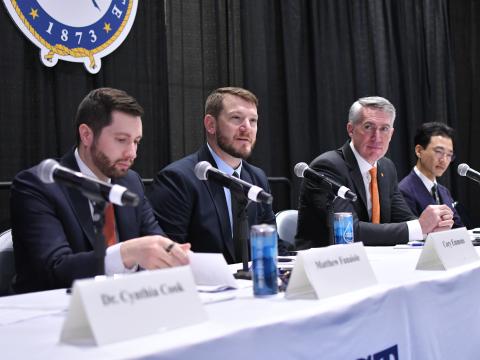The Internet Is Shrinking While Giving Birth
The bottom line is that the Internet today is more like the Wild West than the researchers who gave birth to it envisioned, but its inherent dangers have inspired techno-creativity to an extent that they also could not have anticipated. That’s probably something the bad guys also never predicted.
In 1966, when the Advanced Research Projects Agency hosted the precursor to today’s Internet, the scientists and engineers at academic institutions could not have foreseen the impact their work would have around the globe. For the digital natives out there, yes, there was a time when finding the definition of a word meant hauling out a huge dictionary, and the words “I wonder…” weren’t followed by pulling out a cellphone to find the answer online.
In the nearly five decades since several universities participated in the Resource Sharing Computer Networks program, access to the Internet has become faster, more diverse and nearly indispensable. Just ask anyone who’s waiting an entire minute for a file to download or unable to connect while away from the office … or home for that matter.
The military quickly recognized the power of networking and began taking advantage of it. But with expansion came more opportunities for unsavory characters to use this tool for criminal acts. Whether stealing someone’s identity, breaking into online bank systems or simply defacing a website, it didn’t take long for individuals as well as nation states to figure out that the capability to access information easily could be used as a weapon.
It also didn’t take long for new words and definitions to be added to everyone’s dictionaries: firewall, password, computer virus, malware, Trojan horse and worm were just a few. Almost at the speed of light, the term cybersecurity became as hot as those first fast computers did in mere minutes.
The result? Today, the Internet is shrinking. No longer just an easy way to send or receive information quickly, the Internet has mutated as cybersecurity issues caused many organizations to prevent their employees from accessing certain websites. Email recipients double check with senders—even if they’ve been friends for dozens of years—to ensure that a message is indeed from them and an attachment is safe to open. Information theft is running so rampant that the well-publicized Target incident during the 2013 holiday season recently led to the resignation of Chief Information Officer Beth Jacob..
But the illicit activity that has raised restrictions on Internet activity has given birth to another phenomenon that those original researchers could have never predicted: baby networks for specific groups. One example is milSuite.com, which is larger than an intranet, smaller than the World Wide Web and caters to a distinct audience, the military. With the requirement to sign in with credentials, it enables service members to access information and discussions that fall into the “for their eyes-only” category. While no network can ever be 100 percent secure, milSuite is one example of how people who need the ability to network do not let cybermonsters get in their way.
The bottom line is that the Internet today is more like the Wild West than the researchers who gave birth to it envisioned, but its inherent dangers have inspired techno-creativity to an extent that they also could not have anticipated. That’s probably something the bad guys also never predicted.
In your experience, how has the Internet changed since you began using it? Share your answer in the comments section or email mlawlor@afcea.org.




Comment
Internet history
The world of networks once was segmented into several, with the Internet being the odd network out there. The benefit of having a single network is being able to share everywhere and nearly instantly, the same as the benefit of open sources or sharing in scientific research. (Teller: "Secrecy, once accepted, becomes an addiction." and "Secrecy in science does not work. Withholding information does more damage to us than to our competitors.") Moreover, the ills of the present Internet infrastructure are arguably attributable to its application in commerce and the highly indirect way in which its infrastructure is constructed and how it is funded. If, in fact, components were implemented in full compliance with extant RFCs, many of these exposures would not exist. Indeed, inconsistent enforcement of standard best practice lies at the root of exposure at many companies. Why don't they enforce? Because they have, as yet, no financial incentive to apply the resources these upgrades demand. Do they are about the health and existence of the Internet? No. They are pure opportunists, as are many corporations.
Your recommendations have been around for a long time, but...
Thanks, Jan, for the detailed comment! While writing feature articles years ago, many of the people I interviewed recommended the same. Offer incentives to companies (such as lower data protection insurance rates or requirements to follow certain cybersecurity standards to win contracts) that would "encourage" them to beef up the way they protect the data so many of us entrust them with when we communicate or make purchases online. But alas, nothing has been done. Who do you think should take the lead on this? The government? Non-government overseers? A group of specific companies? Let's get some ideas rolling about solutions.
Again, thanks for commenting! I LOVE engagement! ml
Comments